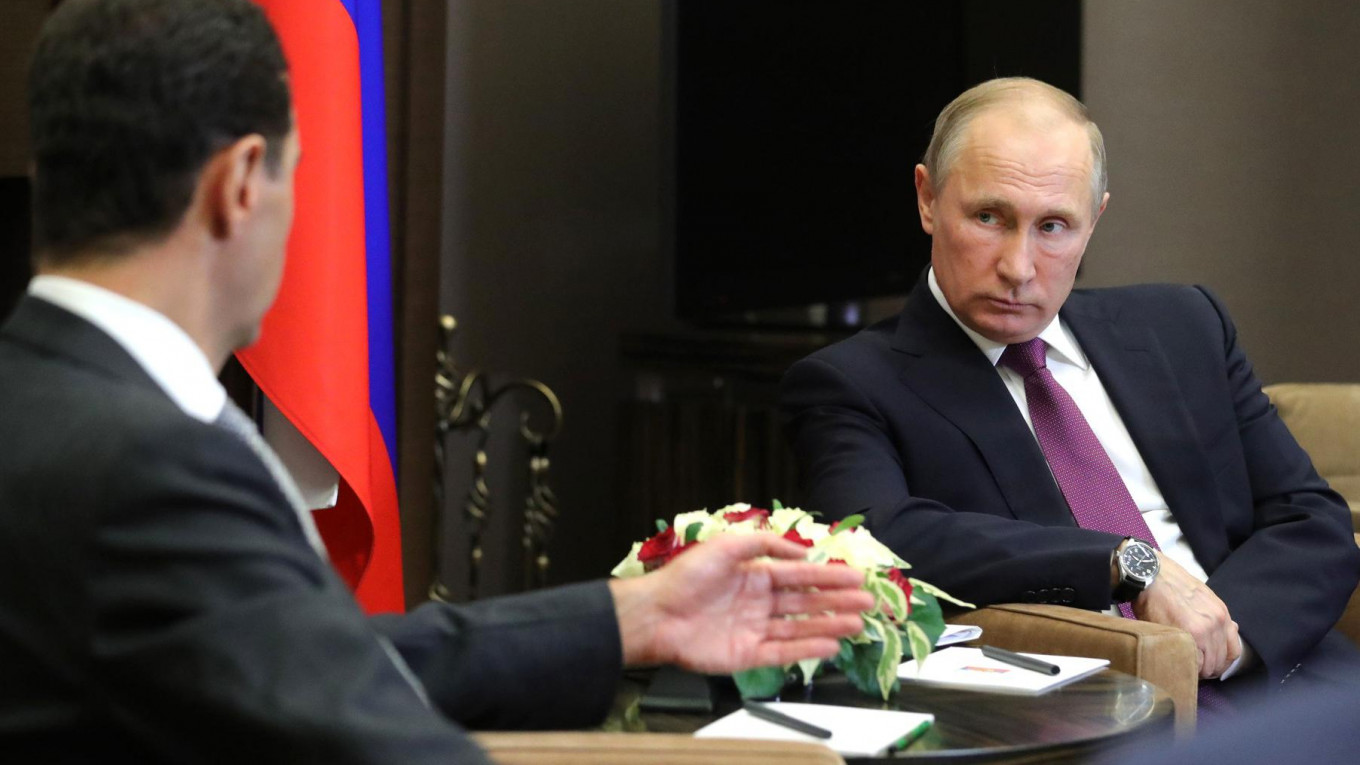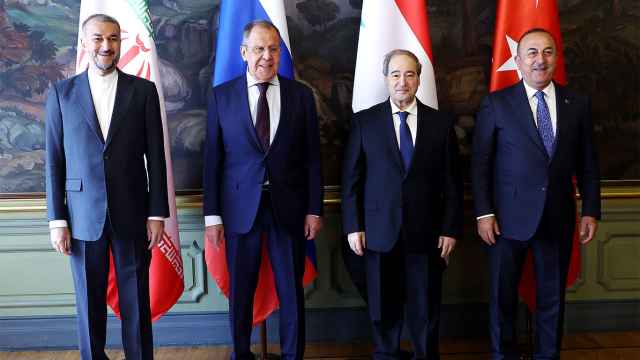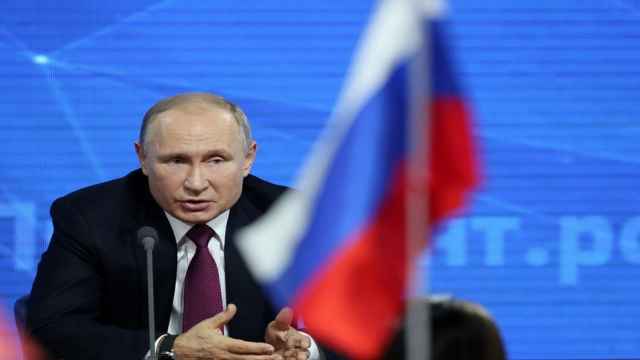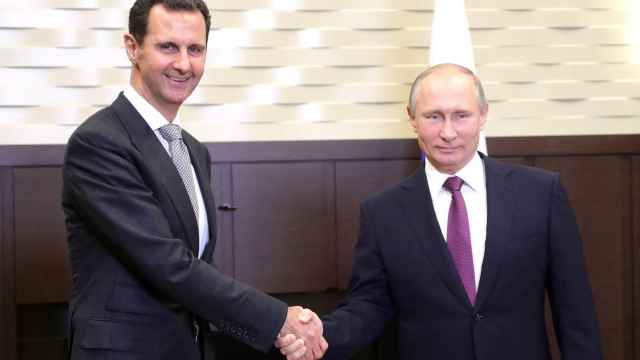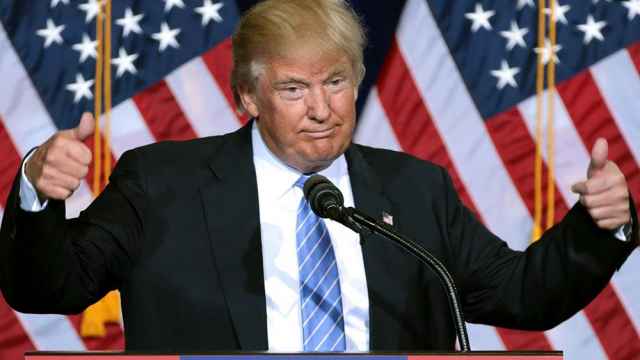President Vladimir Putin looks intent on winding down Russia’s military operation in Syria before he runs for his next presidential term in March 2018. The Kremlin is anxious to put this war behind it as an undesirable distraction during the campaign.
Moscow needs a viable political settlement to consolidate Russia’s military presence in Syria and reaffirm its new geopolitical role as a major power in the Middle East on a par with the United States.
This month, with some immaculate foreign policy scripting, Putin has embarked on a major diplomatic blitz to cobble together a carefully balanced settlement carefully balanced settlement for major players to endorse and impose on Syrian parties.
Putin went to Iran on Nov. 1 to discuss this with Iran’s President Hassan Rouhani and the Supreme Leader, Ali Khamenei. He met with Turkish President Recep Tayyip Erdogan three times in November. He buttonholed U.S. President Donald Trump into an important joint U.S.-Russia statement on Syria on the sidelines of the APEC summit in Vietnam.
He secretly flew Syria’s President Bashar Assad to Sochi to present him with settlement parameters and hosted a trilateral Russia-Turkey-Iran summit on Syria in the same city. The meeting was the first of its kind, and it was reminiscent of the 1945 “Troika Summit” in Yalta to divide the spheres of influence in post-war Europe.
Putin also personally briefed by phone the details of his plans to all major outside players: Trump, Israel’s Prime Minister Benjamin Netanyahu, King Salman of Saudi Arabia, President Abdel Fattah al-Sisi of Egypt, and Emir Sheikh Tamim bin Hamad al-Thani of Qatar. All of this in one day.
This frenetic activity emphasizes Russia’s central role in Syria and the larger Middle East. It underscores Russia’s ability to turn outside powers into stakeholders in the Russian plan. And it shows audiences at home Putin’s grandeur as a pre-eminent international statesman.
Having largely won the war for Assad, Moscow is now eager to win the peace without getting permanently saddled with the economic, political and military costs of holding Syria together.
It needs a veneer of international legitimacy for the political settlement that would keep Assad in power, at least for the transition while Syria is being reconstructed. This is one of the major reasons behind Moscow’s efforts to shield the regime from credible accusations of chemical weapons use at the United Nations.
Still, Russia does not hold all the cards in Syria and cannot impose its will alone without a buy-in from outside players. Here, while Turkey and Iran are Moscow’s primary partners and allies in the Astana process, the United States is the elephant in the negotiating room when Putin hosts the Turkish and Iranian leaders.
Putin and Trump appear to have come to an understanding of the contours of the post-Islamic State* settlement in Syria. In exchange for the U.S. toning down its calls for Assad’s departure, Moscow has acquiesced to a longer-term U.S. military presence in eastern and southern Syria.
The Nov. 8 U.S.-Russia-Jordanian agreement on the de-escalation zone in southern Syria specifically calls for maintaining the opposition-controlled local government structures, independent of the regime.
The same arrangement may apply to much of the north-east, now controlled by the Syrian Democratic Forces (SDF) and the U.S. military.
This area includes Raqqa — Islamic State’s former capital — and could serve as the new opposition’s self-governing territory. With Russia’s guarantees, this territory would be off limits to Iran and Assad, and would participate in a power-sharing scheme under Syria’s new constitution.
This agreement would be akin to Kurdish autonomy in Syria, since most of the SDF are fighters from the Kurdish YPG, under formal Sunni-Arab control.
Another component of the U.S.-Russia understanding seems to be that the areas under U.S. protection in the north-east and the south would serve as a bulwark against Iranian expansion.
Although Moscow’s ability to contain Iran in Syria is limited — and Russia needs Iran’s proxy forces on the ground to safeguard against a likely insurgency — Moscow has agreed on specific limits on Iran-led Shia units near Israel’s borders. In fact, despite the appearance of sidelining the U.S. that the Russia-Turkey-Iran summit implies, Moscow may be moving toward greater alignment with Washington in Syria.
For its part, the U.S. appears reconciled to the fact that Russia would be able to manipulate the settlement process in Assad’s favor through the Russia-led “Congress of Syrian Peoples” to be convened in Sochi on Dec. 2, with 1300 delegates from 33 political groups.
Moscow will use the Sochi forum, which the leaders of Russia, Turkey and Iran agreed to convene, to “tame” the Syrian armed opposition by diluting it with pro-Moscow and pro-Assad groups, who will not insist on Assad’s immediate departure as a precondition for the political transition.
Saudi Arabia appears to be on board with this strategy by hosting a new round of talks in Riyadh to forge an entirely new “united opposition delegation.” In a nod to Moscow, the Saudis agreed to a high-level Russian observer mission at the talks led by Putin’s special envoy for Syria, Alexander Lavrentiev.
The agreements reached this week at the Russia-Iran-Turkey summit appear to be somewhat modest — no specific blueprint for Syria’s political settlement has been unveiled. Details for the Sochi Syrian congress including who will be allowed to take part (there's no agreement on Kurdish participation) have yet to be hammered out.
But one thing stands out: The Sochi congress would result in a new Syrian constitution and a timeframe for new presidential and parliamentary elections in Syria.
While this may not be what is envisioned under the UN’s roadmap for peace, it takes the constitution out of Assad’s hands and is likely to result in a significant dilution of presidential power.
Another Russian move would be to install former Syrian vice-president and foreign minister Farouk Sharaa, a Sunni, as chairman of the Sochi congress, positioning him as a likely leader in post-war Syria.
Moscow may be juggling too many diplomatic balls at the same time but if its peacemaking efforts fail, it will not be for the lack of trying.
*Islamic State is a terrorist organization banned in Russia.
Vladimir Frolov is a Russian political analyst and columnist.
The views and opinions expressed in opinion pieces do not necessarily reflect the position of The Moscow Times.
A Message from The Moscow Times:
Dear readers,
We are facing unprecedented challenges. Russia's Prosecutor General's Office has designated The Moscow Times as an "undesirable" organization, criminalizing our work and putting our staff at risk of prosecution. This follows our earlier unjust labeling as a "foreign agent."
These actions are direct attempts to silence independent journalism in Russia. The authorities claim our work "discredits the decisions of the Russian leadership." We see things differently: we strive to provide accurate, unbiased reporting on Russia.
We, the journalists of The Moscow Times, refuse to be silenced. But to continue our work, we need your help.
Your support, no matter how small, makes a world of difference. If you can, please support us monthly starting from just $2. It's quick to set up, and every contribution makes a significant impact.
By supporting The Moscow Times, you're defending open, independent journalism in the face of repression. Thank you for standing with us.
Remind me later.



